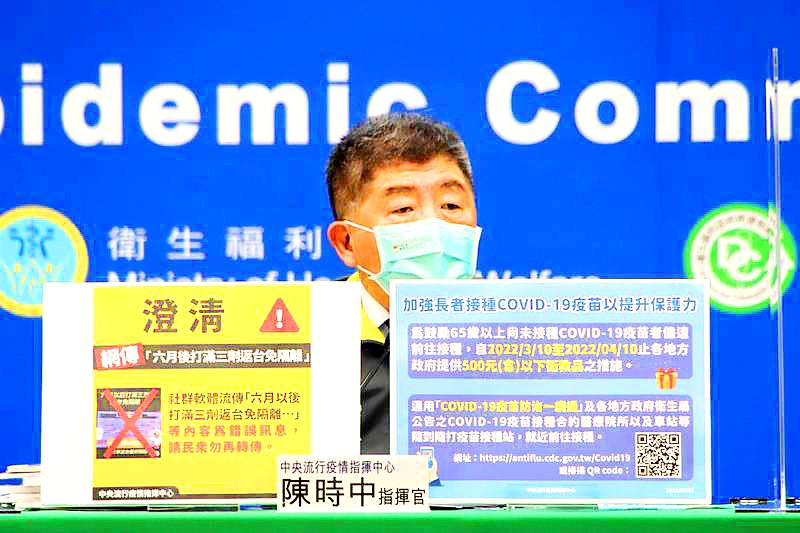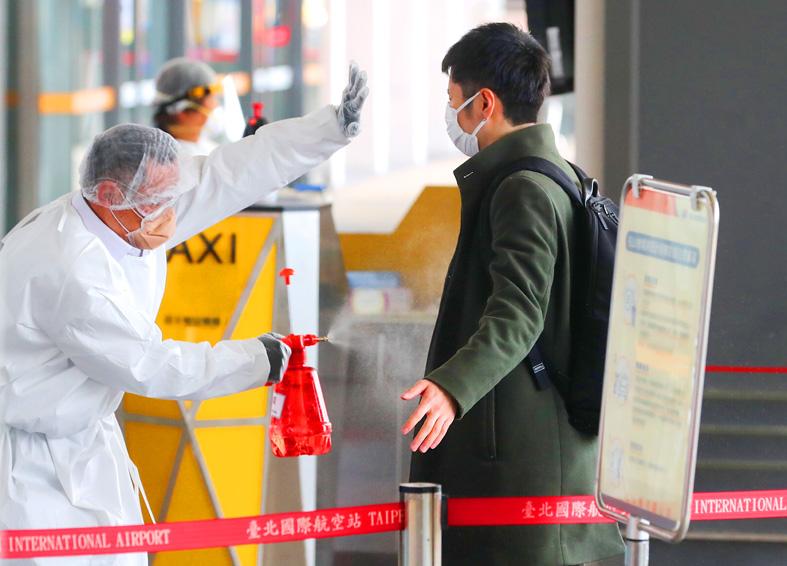Local governments can offer older people an incentive worth up to NT$500 for being vaccinated against COVID-19 from Thursday to April 10, the Central Epidemic Command Center (CECC) said yesterday.
Minister of Health and Welfare Chen Shih-chung (陳時中), who heads the center, said that to encourage people aged 65 or older to get vaccinated against COVID-19, local governments can offer them an incentive worth up to NT$500 when they receive a first, second or third vaccine dose.
Shinkong Wu Ho-su Memorial Hospital vice superintendent Hung Tzu-jen (洪子仁) told the center’s daily briefing that in the UK, 5,482 of the 3.03 million people infected with COVID-19 between Dec. 12 last year and Jan. 16 died, a case fatality rate (CFR) of 0.18 percent.

Photo courtesy of the CECC
A breakdown of the deaths by age and vaccination status showed that the CFR increased as the age group of the unvaccinated patients rose, he said.
While the CFR for unvaccinated patients under 18 years old was 0.002 percent, it increased to 9.66 percent for unvaccinated patients in their 70s, and to 23.558 percent for unvaccinated patients aged 80 or older, he added.
Fatalities were fewer among patients who received a booster dose, even in higher age groups, with a CFR of zero for patients under 18 years old to a CFR of 2.94 percent for patients aged 80 or older, he said.

Photo: CNA
In the group of patients aged 60 years or older, the CFR for unvaccinated patients was 11 times the CFR for patients of the same age group who received a booster, he added.
“A similar situation has been observed in Hong Kong,” Hung said.
However, of 1,153 deaths in Hong Kong between Jan. 1 and Saturday, only 92 people (8 percent) had received two vaccine doses, while 1,061 people (92 percent) were not fully vaccinated, he said.
The CFR for patients not fully vaccinated was 1.25 percent, 31 times the CFR for fully vaccinated patients, he said.
A breakdown by age and vaccination status showed that the CFR for those not fully vaccinated was several times higher than for those fully vaccinated: 20.5 times for those in their 50s, 17.7 times for those in their 60s, 9.5 times for those in their 70s, and 9.5 times for those aged 80 or older, Hung said.
Among Hong Kongers aged 80 or older, 51.15 percent have received a first dose, 30.93 percent a second dose and 1.6 percent a booster dose, Hung said.
Among Taiwanese aged 75 or older, 75.5 percent have received a first dose, 69.9 percent a second dose and 50.1 percent a booster dose, he said.
While the rates among older Taiwanese are higher than in Hong Kong, they are lower than among younger Taiwanese, he added.
“Generally, the CFR for people under the age of 50 is relatively low, regardless of their vaccination status, but it is clearly different in older people,” Hung said.
“Young people mainly get vaccinated to prevent the virus from spreading and to protect older people, but older people mainly get vaccinated to protect themselves, especially from severe complications and hospitalization,” Hung added.
Chen said that as of Sunday, the first-dose COVID-19 vaccination rate in Taiwan had reached 82.96 percent, full vaccination coverage was 77.17 percent and the booster dose rate was 44.4 percent.
Meanwhile, starting yesterday, the quarantine period was cut from 14 to 10 days for people who are required to isolate after coming into contact with infected individuals, as well as for all arrivals to Taiwan, including business travelers.
Additional reporting by CNA

CHAOS: Iranians took to the streets playing celebratory music after reports of Khamenei’s death on Saturday, while mourners also gathered in Tehran yesterday Iranian Supreme Leader Ayatollah Ali Khamenei was killed in a major attack on Iran launched by Israel and the US, throwing the future of the Islamic republic into doubt and raising the risk of regional instability. Iranian state television and the state-run IRNA news agency announced the 86-year-old’s death early yesterday. US President Donald Trump said it gave Iranians their “greatest chance” to “take back” their country. The announcements came after a joint US and Israeli aerial bombardment that targeted Iranian military and governmental sites. Trump said the “heavy and pinpoint bombing” would continue through the week or as long

TRUST: The KMT said it respected the US’ timing and considerations, and hoped it would continue to honor its commitments to helping Taiwan bolster its defenses and deterrence US President Donald Trump is delaying a multibillion-dollar arms sale to Taiwan to ensure his visit to Beijing is successful, a New York Times report said. The weapons sales package has stalled in the US Department of State, the report said, citing US officials it did not identify. The White House has told agencies not to push forward ahead of Trump’s meeting with Chinese President Xi Jinping (習近平), it said. The two last month held a phone call to discuss trade and geopolitical flashpoints ahead of the summit. Xi raised the Taiwan issue and urged the US to handle arms sales to

State-run CPC Corp, Taiwan (CPC, 台灣中油) yesterday said that it had confirmed on Saturday night with its liquefied natural gas (LNG) and crude oil suppliers that shipments are proceeding as scheduled and that domestic supplies remain unaffected. The CPC yesterday announced the gasoline and diesel prices will rise by NT$0.2 and NT$0.4 per liter, respectively, starting Monday, citing Middle East tensions and blizzards in the eastern United States. CPC also iterated it has been reducing the proportion of crude oil imports from the Middle East and diversifying its supply sources in the past few years in response to geopolitical risks, expanding

Pro-democracy media tycoon Jimmy Lai’s (黎智英) fraud conviction and prison sentence were yesterday overturned by a Hong Kong court, in a surprise legal decision that comes soon after Lai was jailed for 20 years on a separate national security charge. Judges Jeremy Poon (潘兆初), Anthea Pang (彭寶琴) and Derek Pang (彭偉昌) said in the judgement that they allowed the appeal from Lai, and another defendant in the case, to proceed, as a lower court judge had “erred.” “The Court of Appeal gave them leave to appeal against their conviction, allowed their appeals, quashed the convictions and set aside the sentences,” the judges